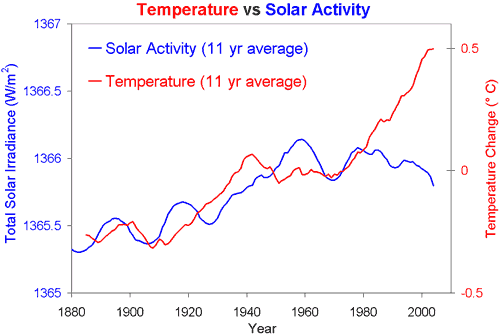Open Letter to London Mayor Boris Johnson - Weather is not Climate
Posted on 21 January 2013 by dana1981
Mayor Johnson, I was rather puzzled to read your recent opinion-editorial in the Telegraph, suggesting that the sun is to blame for global warming because it has been snowing in London in the winter. Quite simply, weather is not climate. The main necessary ingredients for snow are cold temperatures (which tend to occur in winter) and moisture in the atmosphere, which has increased as a result of global warming. In fact, the Intergovernmental Panel on Climate Change has predicted that winter precipitation in the United Kingdom will increase in a warming world.
In your editorial, you acknowledge your lack of expertise on the subject, but defer to weather forecaster Piers Corbyn due to his alleged accuracy in predicting British weather (that accuracy being generally exaggerated, with many counter-examples). However, irrespective of his accuracy in making weather predictions, Corbyn is not a climate scientist; weather forecasting and climatology are very different scientific fields. If your cardiologist informed you that you need open heart surgery, would you ask your dentist for a second opinion?
If Corbyn would like his climate opinions to be taken seriously, he should subject them to the peer-review process like climate scientists do. However, it is very easy to see why he is wrong. Were the sun the main driver of global temperatures, the planet would have cooled slightly over the past 50 years. Instead it has warmed rapidly, and the United Kingdom has warmed nearly 1.3°C during the period of downward solar activity. Additionally, right now we are approaching the peak of the current 11-year solar cycle, which is difficult to reconcile with efforts to blame your wintery weather on low solar activity.

Global temperature (red, NASA GISS) and Total solar irradiance (blue, 1880 to 1978 from Solanki, 1979 to 2009 from PMOD), with 11-year running averages.
Even with the rapid rate of global warming, it will still be cold enough in winter to snow in most places where that has historically been the case. Nevertheless, we are in the midst of the hottest decade on record, which is also difficult to reconcile with Corbyn's assertions that we are headed into a mini ice age.
What might be responsible for your current severe winter weather? As you note in your editorial, some research has suggested that changing atmospheric patterns due to the human-caused decline in Arctic sea ice could be responsible. The US National Oceanic and Atmospheric Administration explains some of the science. For example, Francis and Vavrus (2012) attempted to answer this question.
"Can the persistent weather conditions associated with recent severe events such as the snowy winters of 2009/2010 and 2010/2011 in the eastern U.S. and Europe...be attributed to enhanced high-latitude warming? Particular causes are difficult to implicate, but these sorts of occurrences are consistent with the analysis and mechanism presented in this study."
Jennifer Francis also told The Guardian in September 2012,
"We can't make predictions yet … [but] I wouldn't be surprised to see wild extremes this winter,"
However, British winter weather is still weather, not climate, and only represents a small part of the world. Please also remember that Australia is breaking heat records at the moment, for example.
The scientific data and body of research have very clearly established that human greenhouse gas emissions are causing global warming. This question is indeed settled science, and while your gut or your local weather forecasters may tell you otherwise, they would be wrong to do so.
Before opining about climate science, perhaps ask yourself how you would feel if a climate scientist were to write an article detailing how he would run the City of London very differently than you are, based on his conversations with an attorney friend. You would likely scoff that somebody would publish such an ill-informed article on a subject so far outside of his and his attorney's expertise.
And you would be right, because expertise matters. It's important for our elected officials to consult with individuals with appropriate expertise, particularly on matters as important as climate change. Several British climate experts have offered you their services, and a number of climate scientists were able to quickly explain this subject to The Carbon Brief. The expert resources are available - please make use of them.































 Arguments
Arguments























 0
0  0
0






Comments